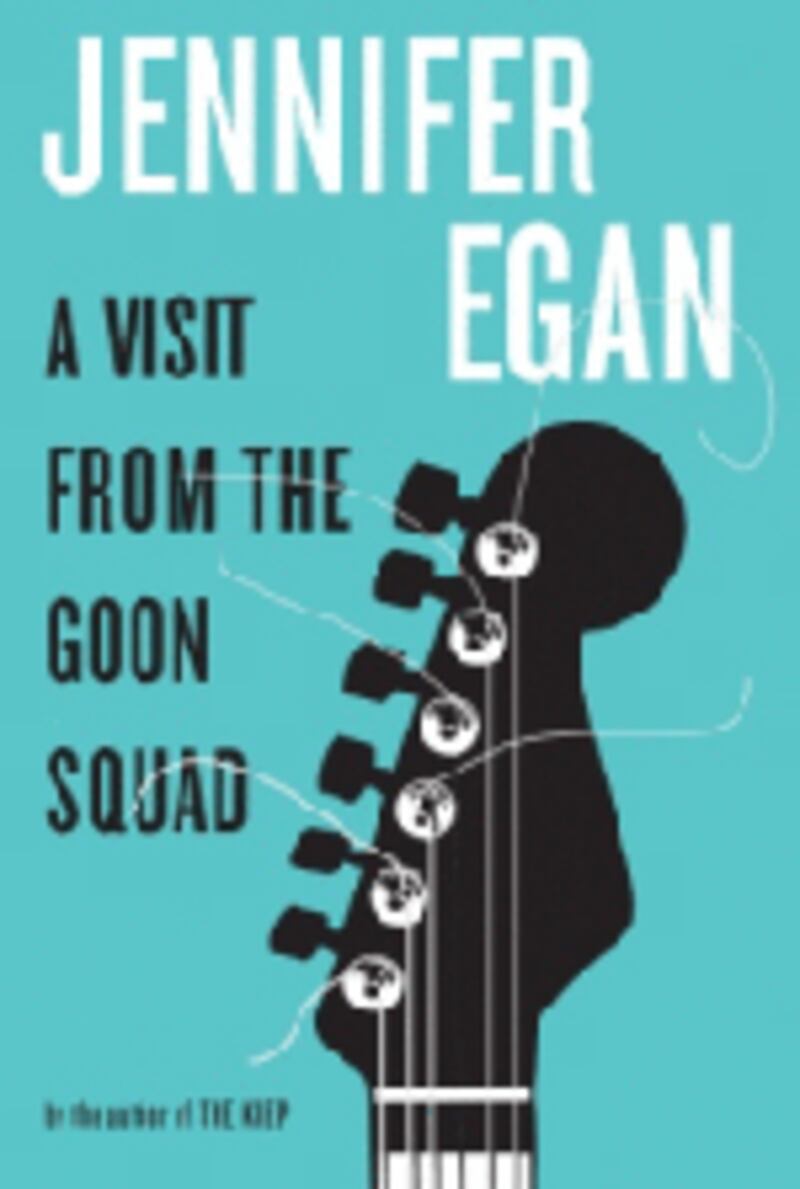
Jennifer Egan was center stage through much of the recent Book Expo America in New York. One day she gave a tightly timed seven-minute talk (with 20 slides, and a strict 21-second limit per slide) about how she wrote a section of her new book, A Visit From the Goon Squad, in PowerPoint (You can watch her presentation and check out the section, “Great Rock and Roll Pauses”), The next day at noon, she talked about audiobooks for half an hour onstage with NPR’s Michelle Norris. At two, she discussed writing about sex with Granta editor John Freeman. (Tidbit: When she was writing her first sex scenes, in her coming-of-age first novel, The Invisible Circus, a friend suggested some models, with page numbers: Sex at a wedding in The Godfather, and an eight-page sex scene in Ken Follett’s Lie Down With Lions.)
Dressed in a stylish sleeveless floor-length dress, the willowy Egan walked in 90-degree heat from the Javits Center to a rooftop West Village penthouse cocktail party, where she chatted amiably into the night.
“Remaining a pop phenomenon for 20 years without dying or lapsing into self-parody is quite a feat.”
I sat down with her the next day at the Aroma Espresso Bar on West 72nd Street. She arrived from her Pilates session with a grocery bag in each hand to take on the subway home to Fort Greene, where she lives with her husband and two sons, aged 7 and 9.
I asked about the title of her new book. Is time the goon?
“I knew as far back as 2001 that I would write a book called A Visit From the Goon Squad, though I had no idea what kind of book it would be,” she explained. “As I worked on it, I kept wondering, ‘Who is the goon?’ I liked the sense that there were many answers. And then I found myself writing ‘Time is a goon,’ and realized that of course that’s true—time is the stealth goon, the one you ignore because you are so busy worrying about the goons right in front of you.”

Egan is an iconoclastic and original fiction writer, hewing to her own genre-bending path and creating fresh starts with each new book. Her finely tuned cultural antennae, her elegant language, and the unpredictability of her imagined universes make reading her work an adventure. Her work is supremely intelligent, psychologically acute, seriously playful, attuned to cutting-edge technology. In Look at Me, her second novel, Egan pondered our outside-in culture as she focused on a fashion model who loses her celebrity after a horrific accident and facial reconstruction. The Keep was her wired contemporary take on the Gothic novel. In A Visit From the Goon Squad, yet another departure, she freeze-frames a punk rocker-turned-music producer named Bennie Salazar, his sticky-fingered assistant Sasha, and an assortment of has-beens, wannabes, faded big shots, and hangers-on at various points in time, including the future.
What’s the source of her originality?
“I have a hatred of familiarity,” she said. “If I feel like I am doing something I’ve done before, it feels old and done. I feel I have no choice but to strike out in directions that feel new—anything less just doesn’t seem worth it.”
A Visit From the Goon Squad does not label itself as a novel, nor as a collection of linked stories, although several sections have been published as short stories. (" Ask Me if I Care" and “ Safari” in The New Yorker; "The Gold Cure," in which Bennie sprinkles gold flakes into his coffee in a frantic effort to restore his mysteriously expired libido, in Granta.)
It’s a “somewhat genre-less work,” Egan said. “One of my organizing principles was always that each piece should stand alone in a strong way, and yet they should all fit together. The metaphor in my mind wasn’t ‘linked,’ but ‘entangled.’”
Offering clues to her fiercely independent creative approach, she reached back to her early years. She was born in Chicago, where her Irish grandfather was a police commander. After her parents were divorced and her mother remarried, she moved to San Francisco, where she attended Lowell High School and considered herself an “unexceptional” student. Being a stepchild, she noted, set her as an outsider within a family, and gave her a yearning to conform. “I never did anything original my whole childhood,” she said. In high school, she added, “I was invisible.” As a teenager in the Bay Area, she went to lots of shows, like the kids in her new book, but she says she was never a “real” punk rocker.
A post-high school solo trip to Europe abruptly separated Egan from her conventional past. “I was a troubled, anxious, and uneasy person,” she said of that time. While in Rome, she experienced a series of panic attacks she thought were drug flashbacks. In those miserable weeks, she said, she decided she would become a writer. “What a gift. I came back with an absolute laser sense of what I was going to do with my life.” Over the years, Egan, now in her mid-40s, has carved out a distinctive niche. Now comes Goon Squad, punk Proust for the Internet era. To what extent has it been influenced by In Search of Lost Time?
“The Proust factor was huge,” she acknowledged. “Our reading group began In Search of Lost Time the week of 9/11 and finished it a couple of years ago, so I guess we were reading Proust for about seven years. I think four children were born among us over the course of it. We read aloud quite a bit, and talked about the book, and drank wine. The moment was right for me; I’ve found myself obsessed with time since I turned 40.”
The first thing that struck me about A Visit from the Goon Squad is its fluid and sometimes circular sense of time. How did she decide on the structure?
“I had a different structural idea originally. My original plan was to have time move backward—I knew this idea wasn’t new (Charles Baxter does it beautifully in First Light) but still, that was the plan. Then I wrote ‘Pure Language,’ which takes place in the future and would have to come first, according to my ‘backwards chronology’ idea. But I knew that story would make a bad beginning for the book. So I adjusted my plan: I’d begin in the present, move farther and farther backward in time, and then leap into the future in the end with ‘Pure Language.’ But I found when I read the chapters in that order that it was flat, and the whole was absolutely less than the sum of the parts. So I ended up ordering the chapters more intuitively, using a completely different principle: Who is the person you’ve glimpsed from the corner of your eye in this chapter, and would be surprised and interested to find is the subject of the next chapter? That’s how it’s organized now.”
One thread of the new book concerns the effect of digitalization on creative artistry. As Bennie puts it, digitalization “sucked the life out of everything that got smeared through its microscopic mesh. Film, photography, music: dead. An aesthetic holocaust!” Egan’s explanation: “I think what drew me into that world now was partly a nostalgic sense that it’s changing irreparably in our digital times, and a desire to honor that change, or acknowledge it, and also to use it as a way of looking at cultural change generally, in response to technology.”
Egan says she had no particular models for her characters. But clearly she has done some thinking about the rapidly cycling life spans of pop artists, including writers. In a reevaluation of Madonna for GQ a few years back, Egan wrote, "Remaining a pop phenomenon for 20 years without dying or lapsing into self-parody is quite a feat." In Goon Squad, Bosco, a character contemplating a “suicide tour,” complains, “How did I go from being a rock star to being a fat f--- no one cares about?” Although Madonna and a rare few others keep on coming around, time passing means most musical careers are dead-ended.
“There’s this funny tension between our cultural desire to be transported backward, and our obsession with the new,” she said. “Madonna’s done a superb job of walking that line; she’s always got a new trick up her sleeve, but part of her appeal comes from her awareness that she’s one more in a long line of female icons… Marilyn Monroe, etc. And the line continues; there would be no Lady Gaga without Madonna. But my 9-year-old loves Lady Gaga and refers to Madonna as ‘old school.’ There’s no way to avoid becoming part of the past.”
But she does offer a brief reprieve for those nostalgic for a cultural era that appears to be sloughing away before our eyes. “ Goon Squad is full of pauses. There are pauses between chapters, pauses where action happens that we don’t see. In ‘A to B,’ Stephanie tells Jules she feels like everything is ending, and he responds, ‘Yes, everything is ending. But not yet.’ I saw this book as happening in that ‘not yet.’”
Plus: Check out Book Beast, for more news on hot titles and authors and excerpts from the latest books.
Jane Ciabattari’s work has appeared in Bookforum,The Guardian online, The New York Times, Los Angeles Times, Washington Post, Columbia Journalism Review, among others. She is president of the National Book Critics Circle and author of the short-story collection Stealing the Fire . Recent short stories are online at KGB Bar Lit, Verbsap, Literary Mama and Lost Magazine.






